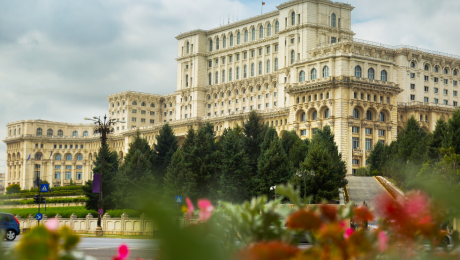Foreign investors are losing interest in the Romanian economy
According to Valahia News, personal remittances from Romanians working abroad exceed direct investments in the country. This is the first instance of this happening. Romanians who work in foreign countries are the largest foreign investors in the country, but this is not good news at all.
This shows that investors have lost faith in the Romanian economy. Romania is currently borrowing at the highest rate of the European Union which is 5.37%. Romanian borrowings were at this high-level last year when the interest rate was 5.433%. Germany, for comparison, borrows money at negative interest.
With energy prices rising rapidly, inflation is on the rise and has already reached 7.80% as of November.
According to the former Romanian Prime Minister,Mr. Florin Citu, Romania may be required to request an emergency loan from international financial institutions:
“There is one more thing, of vital importance. The confidence of the investors in Romania’s Government. Without their confidence, in the current global context, Romania could be forced to ask for an emergency loan from international institutions.”
Florin Citu warned the country’s new leaders about two options for resolving the situation, both of which fall under the purview of the National Bank of Romania: weakening the local currency or increasing the monetary policy rate even further.
In any case, it means hard times for the typical Romanian worker. Meanwhile, these harsh policies may be able to give a needed boost to the Romanian economy.
DO YOU NEED LOBBYING SERVICES?
- Published in News
Romania has a new Government
Romania’s new Government was empowered on November 25th. The ceremony took place at the Presidential Palace, in the presence of Romana’s President Klaus Iohannis. The new Prime Minister is Nicolae Ciuca.
The new government coalition comprises the Social Democrats, the Liberals, and the Hungarian minority party. The cabinet was voted with a comfortable majority of 318 votes, with more than 80 more than the required minimum of 234 votes. USR and AUR lawmakers voted against it. Ciuca Government Ministers took the oath in Cotroceni. This new Government puts an end to the political crisis that lasted almost three months.
The Ciuca government will have 20 ministries to which the position of general secretary of the Government will be added. Compared to the previous Government, the Ciuca Government has two new ministries: the Ministry for SMEs and Tourism and the Ministry of Youth and Family.
Another concern when considering the new Government is the rotation principle, applied for the first time in Romania: the present Prime Minister must quit in May 2023 and leave the Social Democratic prime minister’s office, who will head the government until elections are held in 2024.
Experts immediately sense a rift between the former political opponents, and predictions suggest that this Government would only last a year.
With the new Government, those in charge need to think about the right solutions to get over the economic issues and the pandemic problem.
DO YOU NEED LOBBYING SERVICES?
- Published in News
What’s new on lobbying in the European Union
Lobbying in the European Union, also known as European interest representation, is the activity of representatives from various interest groups or lobbies attempting to influence the European Union’s executive and legislative bodies through public relations or public affairs work.
The European Commission has released its second rule-of-law report, which contains updates on how lobbying regulations have evolved in EU nations in the ten months since the previous report. ‘Lobbying is a legitimate act of political involvement,’ according to the Commission, and ‘it must be supported by strong openness and integrity standards to guarantee responsibility and inclusivity in decision-making.’
What is lobbying?
By definition, lobbying is any action aimed at influencing the development or execution of policy or the decision-making process in relation to legislative or regulatory activities, either directly or indirectly. The world we live in has an impact on all policies. We, as citizens, have a say in the laws we live by, whether by voting in a new government, writing to your local representative, or supporting causes. In this context, lobbying refers to the organized involvement and advocacy provided by professional public affairs practitioners, sometimes known as lobbyists.
It’s an elaborate field, and people who work in it need to be well-versed in politics, business, communication, and legislation. It necessitates a transparent and ethical foundation at its heart.
Updates on lobbying rules in the European Union
In Romania, the lack of lobbying rules for MPs continues to be a problem. In terms of codes of conduct for members of Parliament, GRECO has lately emphasized the lack of enforcement of the rules, as well as the lack of regulations on how members of Parliament interact with lobbyists, as well as clearly defined limitations on gifts, hospitality, favors, and other perks.
Lobbying in Belgium
In Belgium – in terms of lobbying rules for members of Parliament and rules for contacts between persons with high executive duties and lobbyists, there are still some gaps. Everyone who intends to influence the policy-making and decision-making process, as well as its execution, will be obliged to register, whether directly or indirectly.
The register will cover a wide range of companies and organizations, including law firms, trade unions, non-governmental organizations, religious representatives, trade associations, think tanks, and academic institutions, in addition to professional consultancy agencies, in-house lobbyists, and independent consultants.
Lobbying in Austria
In Austria – Lobbying legislation is being looked into. While a legislative framework for lobbying exists, its breadth and the information made publicly available in the lobbying register are restricted, as stated in the 2020 Rule of Law Report. The Court of Audit proposes that the Lobbying Act be reviewed to see how international lobbying norms may be taken into account more completely, including the establishment of a legislative footprint. In autumn 2020, the Federal Ministry of Justice will convene a working group to study legislative framework changes.
Lobbying in Bulgaria
In Bulgaria – Lobbying continues to be unchecked. Although lobbying regulation is included in the national action plan in response to the 2020 Rule of Law Report, more tangible actions must be implemented.
Lobbying in Denmark
In Denmark – Contacts between policymakers and lobbyists to influence policymaking are still uncontrolled. Ministers and special advisers are not bound by any lobbying regulations, except from general rules on secrecy and conflicts of interest. Furthermore, there is no obligation for interest representatives to report on their actions. As GRECO points out, growing lobbying’s effect on decision-making needs more guidance and openness.
Lobbying in France
In France – The HATVP has suggested a change to the lobbying laws. The HATVP is in charge of keeping track of the lobbying registration. The rate of disclosures received by registered lobbyists was 90% in November 2020. In 2020, the HATVP proposed that, as advised by GRECO, the lobbying statute be changed to cover lobbying individuals (rather than just organizations) starting contact with high officials. To yet, the government has made no suggestion. The HATVP’s mission was extended in 2020 to include oversight of the execution of the incompatibility and revolving door restrictions. An incompatibility is found in 10% of the controlled instances on average.
Lobbying in Finland
In Finland – lobbying is still uncontrolled, and legislation to create a transparency registry is in the works. A study on lobbying activities in Finland was recently released by the Ministry of Justice. Lobbying is identified as a common technique that is often hidden from view in the study. A special parliamentary working group is continuing to work on legislation to create a transparency registry, with the goal of improving decision-making and increasing public confidence. Lobbyists who influence decisions at the federal level, excluding municipal and regional governments, will be required to register as a first step, however, the scope of the requirement may be expanded subsequently.
Lobbying in Germany
In Germany – in March 2021, new federal legislation establishing a lobby register for interest representatives was passed, and it will go into effect on January 1, 2022. The bill attempts to make the government decision-making process more transparent. It establishes guidelines for lobbying efforts directed towards the German Federal Parliament, the German Government, and other ministries. However, the most prominent lobby players in Germany, such as trade unions, employer organizations, churches, and religious communities, are excluded from the required registration requirement. The Parliament will oversee the electronic lobby register, which will be operational by January 1, 2022.
Lobbying in Greece
In Greece – in comparison to the preceding reporting period, there has been no change in lobbying regulation.
In Hungary – Lobbying regulation is still in its development, and there is no method for enforcing it. Lobbyists are not required to register or disclose their contact information. Employees of state administrative organizations may only contact interest representatives regarding their job after alerting their superiors, who may ban the meeting, according to a 2013 Government Decree. Meetings with interest representatives must be documented, but they are not required to be made public. In the case of members of Parliament, GRECO has suggested a clear set of regulations for dealing with lobbyists.
Lobbying in Italy
In Italy – there is no legislation prohibiting lobbying of government officials, however, many proposed bills have been submitted to Parliament. Based on the experience with the Ministry of Economic Development and the Ministry of Labour’s Transparency Registers, the draft legislation offers a basic framework for dealing with interest representatives. There is no mention of a ‘legislative footprint,’ but the government has committed to forming a working group to develop a unified national transparency register, which will include public agendas of all decision-makers disclosing meetings with lobbyists, according to the 4th National Action Plan for Open Government.
Lobbying in Spain
In Spain – Lobbying laws are currently being debated, with the development of a transparency register set for 2022.
Lobbying is currently unregulated on a national level in Spain.
The proposed law was open for public comment from April 28 to May 28, 2021, and is likely to include a definition of interest organizations, a required register for interest representatives and members, and a code of conduct controlling members’ and lobbyists responsibilities, among other things.
A system of sanctions and revolving door restrictions between top officials and government staff is also anticipated to be implemented.
By October 2021, the draft should be completed and authorized by the government in the spring of 2022.
Lobbying in Slovakia
In Slovakia – Slovakia has promised to produce a proposed lobbying law by November 2021.
The Government Office’s procedure is still in its first stages.
Several attempts have been made to pass laws, however, lobbying in Slovakia remains unregulated.
As a result, there are no legal definitions of lobbyists, lobbying activity, or lobbying goals, as well as no meaningful fines or legislative imprint for abusive lobbying.
In 2021, a Code of Ethics for Members of Parliament will be introduced, as well as a legislative regulation on post-employment norms (‘revolving doors’).
Lobbying in Portugal
In Portugal – Lobbying is still a work in progress, with efforts to create new legislation to regulate lobbying operations. Three parliamentary parties have presented legislation to alter the proposed regulations to address the issues that prompted the President’s rejection in 2019. While the parliamentary procedure is underway, no information on when it will be approved and implemented is available. The necessity to define the scope of permitted interactions between members of Parliament and third-party interests, as emphasized by GRECO, remains unresolved.
Lobbying in Sweden
In Sweden – Lobbying in Sweden is still uncontrolled. There is no requirement for decision-makers to proactively report interactions with interest representatives in a ‘legislative footprint,’ or to publish information on who attempted to influence which legislative initiatives with what resources. Lobbyists and interest advocates are not required to register in a lobby register, nor are they compelled to reveal their clients or financial details linked to their lobbying activity. Overall, however, public openness, transparency, and access to information continue to be the cornerstones of Sweden’s anti-corruption strategy.
Source: Aalep.eu
Lobbying in Europe – still undergoes heavy challenges
The lobbying activity helps to maintain and improve the public trust, trust in the democratic institution, and the representation process of public politics. In the end, international lobbying never excludes diplomacy and vice versa, these are complementary layers that become intertwined, as the decision-making process becomes more complicated.
DO YOU NEED LOBBYING SERVICES?
- Published in News
All you need to know about grassroots lobbying
Grassroots lobbying is an important term that refers to appeal to the public to take a stand before the legislature on a particular issue. In essence, it is the same as what we call in Romania „indirect lobbying„. It is called indirectly, as the influence of legislation is achieved by stimulating community members to communicate with decision-makers. Therefore, the initiators of the approach no longer act on their own, by establishing personal contacts with decision-makers, as in the case of direct lobbying, but encourage public opinion to influence the adoption of political decisions.
To be considered grassroots lobbying, an organization (such as a nonprofit) cannot announce its opinion on specific legislation and encourage its members to contact their legislators/government agency about that legislation.
Typical grassroots lobbying expenditures include:
– newspaper advertisements or press releases to support the proposed legislation,
– hiring a person to organize public meetings in order to influence action on issues being considered by the legislature,
– creating or maintaining websites, purchasing e-mail lists, or hiring someone to conduct other online activities, and
– hiring signature gatherers to circulate petitions for an initiative to the legislature.
The benefits of Grassroots Lobbying
Grassroots lobbying has some additional benefits, such as:
- Increasing public support for an issue among constituents
- Offering solutions that the public would like to see enacted
- Enabling constituents to become politically active
- Representing the voices of the many
- Expressing viewpoints of a minority group
Direct Lobbying and Grassroots Lobbying – what is the difference between them
You conduct direct lobbying only when your organization states its position on specific legislation to statesmen or other government employees, such as staff, government agencies who participate in the formulation of legislation or urge your members to do so. For example, a charity staff person urging a city council member to vote for an ordinance would be an illustration of direct lobbying.
Direct Lobbying consists of any attempt to influence legislation through communication with any member or employee of a legislative body, or any government official or employee (other than a member or employee of a legislative body) who may participate in the formulation of the legislation, but only if the principal purpose of the communication is to influence legislation. Communication with a legislator or government official will be treated as a direct lobbying communication, if, but only if, the communication: refers to specific legislation, and reflects a view on such legislation.
While grassroots lobbying is usually done by small, volunteer groups with little budget, the direct lobby is made by large organizations that have money and need a specific change in legislation or policy.
The differences between Direct Lobbying and Grassroots lobbying
The main difference between direct and grassroots lobbying is that, for direct lobbying, one person goes out and tries to influence a politician by using their own credentials or by offering them some sort of incentive. On the other hand, in grassroots lobbying, many people are mobilized in order to reach one goal or change in policy.
Also, grassroots lobbying is less formal and regulated than direct lobbying. The two forms of lobbying work together and they both correspond to different groups in society.
To achieve the best results, indirect lobbying or grassroots lobbying involves:
- Verbal and written communications
- Electronic and social media communications
- Attending a meeting with policymakers
- Speaking on the phone with lawmakers
In conclusion
The lobbying activity helps to maintain and improve the public trust, trust in the democratic institution and the representation process of public politics. In the end, international lobbying never excludes diplomacy and vice versa, these are complementary layers that become intertwined, as the decision-making process becomes more complicated.
DO YOU NEED LOBBYING SERVICES?
- Published in News
Lobby activities in Romania and their evolution
Lobbying in Romania
Lobbying represents the work that consists of interventions designed to directly or indirectly influence the conception, implementation or interpretation of legislative measures, rules, regulations and, more generally, of all speeches or decisions of the political decedents.
States generally define lobbying as an attempt to influence government action through either written or oral communication. However, each state may have unique elements for what constitutes lobbying, exceptions to the definitions, and exceptions to those exceptions.
Different interest groups have had a profound impact on the public decisions process from the beginning of the 20th century until now. This impact can be observed on the parties that are involved, respectively lobby groups, political makers, but also at the public opinion level that can be involved and criticize the dialogue between those groups.
The lobbying activity in Romania is difficult to analyze considering the permissive legislation, which allows lobbying companies not to disclose any piece of information about the clients or the money involved in the lobbying campaigns.
Therefore, we can draw some interesting conclusions regarding Romanian lobby:
– the lobbying activity in Romania is still in an early stage
– regarding the situation of the lobbyists in Romania, they will have to find a fair and pragmatic level of transparency in the practices of lobbying, defining the typology of information that is required to be disclosed
– the inclusion of the lobby in a coherent way of recognition in order to gain a well-deserved place in the political system should be one of the priorities of the Romanian government
The lobbying activity in Romania should be clearly defined
The lobbying activity helps to maintain and improve public trust, meaning the trust in the democratic institution and the representation process of public politics.
Furthermore, the professional lobby activity and interest groups have the obligation to always act with ethics and moral in their relations with all parties involved. Currently, there is a Romanian lobbying law, but that is only a draft and the politicians offer no signs of future legislation. This draft law is considered adopted by the Senate in the initial form, under the conditions of article 75 (2) thesis III of the Constitution of Romania republished. The final version of the law will be approved by the Deputed Chamber.
As we already talked about it, the lobbying activity in Brussels, at the heart of the European Union, is a very dynamic one, recognized by the European Union officials as a necessity for the democratic process.
Examples of lobbying activities: studying the decision-making process, informing decision-makers, establishing high-level relationships, setting up networks, providing expertise, participating in study groups, organizing conferences, visits, drafting amendments to a draft law etc.
Influencing factors of lobby in Romania
An important factor that influences the quality of the lobby and also the quality of the lobbyists in Romania is the quality of the public life and the politicians. Communism, which has marked the history of the country for several decades, has left its mark on the structure of contemporary politicians and decision-making mechanisms. The lobby, which depends on the administrative-political structures and on the politicians, knows a deficit of public perception with a double causality: the lack of confidence in politicians and communist nostalgia. The transparency of the decision-making process and public debates that occur in regulatory projects in Romania aren’t always at the level wanted by the interest groups; Romania has a long way to go in the direction of opening and professionalizing the dialogue between authorities and interest groups.
In Romania, the contribution of Romanian lobbyists to the creation of public policies is hard to detect today, but the situation will change as public policies will be proposed by a plurality of voices such as NGOs, think tanks, groups and professional organizations.
The lobby is at the beginning, but the greatest amount of influence is made by non-governmental organizations, lawyers, civil society, corporations, trade unions and others.
DO YOU NEED LOBBYING SERVICES?
- Published in News
Advocacy vs. Lobbying: What’s the difference?
What is an advocate?
By definition, an advocate is a person who publicly supports or recommends a particular cause or policy.
Advocacy is defined as any action that speaks in favour of, recommends, argues for a cause, supports or defends, or pleads on behalf of others.
Not all advocacy is lobbying, but all lobbying is advocacy.
If an organization wants to get more involved in advocacy, it should inform about the current policies and problems affecting the community. You can be an advocate by educating policymakers about the needs of your organization and the people you serve and developing a relationship where you act as a trusted voice on policy issues.
That is why it is important to start with the original meaning of this word: the word “advocacy” comes from the Latin ‘advocare’ and literally means ‘to call out for support’. The origins of advocacy date back to ancient Rome and Greece when well-established orators would perform as advocates or wrote orations specifically for pleading someone’s cause. Personalities such as Cicero and Caesar were among the greatest Roman lawyers and advocates.
Why does advocacy is so important?
When done effectively, advocacy influences public policy by providing a conduit for individuals and organizations to voice an opinion. These efforts can, in turn, sway public opinion, garner press coverage, and ultimately provide policymakers with an opportunity to respond to constituents’ needs.
Advocacy seeks to ensure that all people in society are able to:
- have their voice heard on issues that are important to them
- protect and promote their rights
- have their views genuinely taken into consideration when decisions are being made about their lives
- have their views take into consideration when decisions are being made about their lives, and to express their views, thoughts and concerns
Advocacy is a process of supporting and enabling people to:
- Express their views, thoughts and concerns
- Access information, advice and guidance
- Explore choices and options for services and care
Advocacy vs. Lobbying
Policy advocacy is the process of negotiating and mediating a dialogue through which influential networks, opinion leaders, and ultimately, decision-makers take ownership of your ideas, evidence, and proposals, and subsequently act upon them. Keep in mind that these activities cross the line into lobbying if they call for action on introduced legislation or a pending regulation.
Lobby is normally associated with the actions of interest groups. Defined as those activities that target policy-makers with a view to influencing policy outcomes and bringing them close to the interests and goals of the lobbyists, the role of lobbying and how different interest groups manage to shape public policies is a crucial issue for scholars. Given its importance in terms of who wins/loses in politics and who influences whom, lobbying has thus generated a large number of studies that have tried to assess the influence of interest groups, to gauge the evolution of the lobbying population and to evaluate their role in terms of democratic accountability and/or biases that the system might have towards certain actors. Interestingly, lobbying does not only occur on issues of domestic policy, but foreign policy is an important aspect as well.
The lobbying activity helps to maintain and improve the public trust, trust in the democratic institution and the representation process of public politics.
What is an Advocacy Campaign?
An advocacy campaign is a set of actions targeted to create support for a policy or proposal. For example, the goals of an advocacy campaign may range from drafting and passing a new or amended law against domestic violence; to reforming the judicial system; to litigating a test case using international human rights standards in domestic courts; to monitoring the implementation of international human rights standards in a local context.
In conclusion – what is advocacy and how it can help?
If we try to describe advocacy and its original meaning, we come across many different definitions that are specific to particular countries, cultures, decades and political regimes.
Advocacy is a social change process affecting attitudes, social relationships and power relations, which straightens civil society and opens up democratic spaces.
DO YOU NEED LOBBYING OR ADVOCACY SERVICES?
- Published in News
Lobbying transparency in Romania
Lobbying means any action or means of promotion carried out by a person/group of persons with the aim of influencing the activity of the legislative or executive power in a state, regardless of whether this action is done at the local or international level.
Influencing is done by communication and by informing the official bodies about the advantages and disadvantages of a certain legislative measure.
The lobbying activity in Romania
The lobbying activity in Romania has to be clearly defined, with the difference between the conduct of this professional activity and the activities of the civil society organizations. It clearly distinguishes between a legitimate action and an act of corruption: the lobby is a central and legitimate part of the democratic process within the framework of the liberal democratic systems.
A lobbying law has been a demand of the business environment in Romania for many years, but all initiatives on this topic since 2000 have either been rejected or abandoned. The definition of lobbying will have to be very finely tuned in order to not be interpreted as influence peddling.
So far there has been no deep knowledge about lobbying activities in Romania. Only a few pieces of information about the actors of this industry were presented, but they did not contain concrete mechanisms and tools, successful approaches, or about the shortcomings and errors of local lobbying efforts.
Romanian Lobbying Law
The professional lobbying is at the beginning in Romania, but, like everywhere else, the biggest volume of influencing activity is made by professional organizations, business associations, NGO, by the civil society, employers unions, corporations, think tanks, lawyers and others.
Beyond the issue of legitimacy, the industry of lobbying has generated heated debates on whether regulation is adequate or necessary in the field.
This draft law of the Romanian Lobby Law is considered adopted by the Senate in the initial form, under the conditions of article 75 (2) thesis III of the Constitution of Romania republished. This text is an unofficial translation from Romanian to English of the project of Romanian Law adopted by the Senate. The final version of the law will be approved by the Romanian Chamber of Deputies.
In conclusion
Repositioning the lobbying activity in Romania is a process that can be achieved taking into account three basic directions: lobbying, ensuring transparency in the decision-making process and in the act of governing.
The paradigm shift will have to involve both participants in the process of political persuasion: lobbyists and politicians. Lobbyists, both through professional associations and also individuals will most likely become the engine of the major changes in Romania in the next 5 to 10 years.
DO YOU NEED LOBBYING SERVICES?
- Published in News
Lobby in Romania vs Lobby in the EU
The lobbying activity in Romania
Lobbying means any action or means of promotion carried out by a person / group of persons for the purpose of influencing the activity of the legislature or the executive in a State, whether that action is done at the central, international level or the local one.
To speak the truth, the Romanian lobbying activity is still at its early stages. Therefore, the general behavior of lobbying firms in Romania is reactive, to correct or improve some decisions already taken.
The lobbying activity in Romania is difficult to analyze considering the permissive legislation, which allows lobbying companies not to disclose any piece of information about the clients or the money involved in the lobbying campaigns.
The credibility and legitimacy of lobbyists will come in time only from the adoption of a code of professional ethics assumed and accepted by all categories of lobbyists in Romania.
Indeed, it is an industry at the beginning of the road, but it is an industry that will grow significantly over the next years. Assumption and transparency are the elements that will generate the paradigm shift and will save this profession from a stigma based on myths generated by ignorance and civic disinterest on the part of the masses, but also by the opaque nature of lobbying.
The lobbying activity in Romania is difficult to analyze considering the permissive legislation, which allows lobbying companies not to disclose any piece of information about the clients or the money involved in the lobbying campaigns.
The credibility and legitimacy of lobbyists will come in time only from the adoption of a code of professional ethics assumed and accepted by all categories of lobbyists in Romania.
Indeed, it is an industry at the beginning of the road, but it is an industry that will grow significantly over the next years. Assumption and transparency are the elements that will generate the paradigm shift and will save this profession from a stigma based on myths generated by ignorance and civic disinterest on the part of the masses, but also by the opaque nature of lobbying.
The main positive aspects of lobbying are:
- improving the transparency of the decision-making act and the active participation of the civil society in the decision-making process
- increasing the quality of the decisions adopted, by providing professional information to the decision makers
- changing the mentality of approaching the relations between the issuers of legislative decisions and their addressees
- transparency on information about whether or not to support a particular issue.
Lobbying in the European Union
Lobbying at EU level is based on an agreement between the European Parliament and the European Commission on the establishment of a transparency register for organizations and self-employed people involved in the development and implementation of EU policies.
The purpose of this agreement is to allow the registration of all activities carried out in order to directly or indirectly influence the development or implementation of policies or decision-making by the EU institutions.
There is a Transparency Register, and the registration in it is done on a voluntary basis, online and includes the identification data and the people involved in the lobbying activity. The register provides rules regarding the conduct of lobbyists, the categories of persons / organizations that can register, the mechanism for resolving complaints and measures applicable in case of non-compliance with the code of conduct.
The lobbying activity in the current Romanian political context
Romania, as a semi-parliamentary or a semi-presidential republic, has a relatively constant number of parliamentary parties. The longevity of the political structures is usually followed by the development of a lobby industry, which in Romania was not possible until recently.
Under these conditions, the inclusion of the lobby in a coherent way of recognition in order to gain a well-deserved place in the political system should be one of the priorities of the future Romanian governments, following the European tendencies.
Yes, at the moment there is a Romanian lobbying law, but that is only a draft and the politicians offer no signs of a future legiferation.
As we already talked about it, the lobbying activity in Brussels, at the heart of the European Union, is a very dynamic one, recognized by the European Union officials as a necessity for the democratic process.
In conclusion
There is no doubt that the Romanian society needs more transparency from all the actors participating at the process of influencing and decision making that affects the society. The lobbying activity in Romania should be clearly defined, with the difference between the conduct of this professional activity and the activities of the civil society organizations. It clearly distinguishes between a legitimate action and an act of corruption: the lobby is a central and legitimate part of the democratic process within the framework of the liberal democratic systems.
DO YOU NEED LOBBYING SERVICES?
- Published in News
Social media as an effective lobbying tool
How to use social media effectively when lobbying
Social media can help increase communication’s capacity and is usually used for legislation monitoring, strategy, keeping up to date with industry news, networking and coalitions building. Social media platforms and website publications can be used in online lobbying to either influence or change public opinion. And since they have increased in popularity, they can be used to reach millions of people. Let’s take a good example, such as Facebook. Nearly everyone owns an account on this platform. If used, it can result in massive political influence. Citizens are given access to information and contribute to decision making.
The political stability of a state is directly based on the stability of the public policymakers and the interactions between them and the interest groups. The lobbying activity helps to maintain and to improve the public trust, trust in the democratic institution and the representation process of public politics.
For example, through social media corrupt leaders can be identified and brought to justice. It has become a conduit for democracy in developed countries. This is a clear indication that there is a bright future for social media in online lobbying. Social media has the benefit of reaching a huge number of people and spurring them into taking positive action.
Social media as a tool for lobbying
Social media is now a major tool for carrying out all types of research and engagement for both lobbyists and policymakers. Social media is especially useful as it’s easier to be used for repeating messages (in a variety of ways) in a non-intrusive manner. It is beneficial to embrace and some of its benefits are:
– Shape online policy environment and public debate
– Raise awareness and engagement on a policy topic in a timely and interactive manner;
– Monitor positions, conversations and reputation of stakeholders
– Create credibility for your organization
– Gain instantaneous feedback
– Mobilize a larger number of people
The role of Social Media in Online Lobbying
Nowadays, social media has amassed a lot of followers of different ethnicities, age groups, and political interests. Therefore, it has become the ideal place for politicians to find their audience. When it comes to online lobbying, social media ensures direct contact between voters and politicians.
National and international matters can be discussed over the internet by politicians, and voters can be influenced to make certain decisions. Politicians also brace the digital world by putting up their adverts on social media, apart from posting adverts on different websites. In today’s politics, public opinion is highly dependent on what a politician uploads on their profiles.
If policy-makers hear the message a number of times through various different channels, then they are more likely to take note.
Social media gives feedback on the effects of online lobbying
The same tool that is used for online lobbying is also responsible for giving feedback on the effects of the campaign. Social media is used to weight the impact of online lobbying. For instance, campaigners can analyze whether a specific campaign was effective or not. They can also know if it was embraced or rejected by the public. The reason for this is, not all political lobbying campaigns are successful. Some don’t influence the decision-makers. Through feedback, campaigners can know how to tailor their messages in order to lobby online successfully.
In conclusion
Social media is increasingly becoming an important lobbying resource when integrated into a wider communications strategy.
Lobbying is a mode of action, often unobtrusive, as opposed to mass demonstrations that mobilize a large number of people. Lobbying refers to exercising of legal pressure on politicians, public authorities and, more broadly, decision-makers.
The lobbying activity helps to maintain and improve the public trust in the democratic institutions and the representation process of public politics. In the end, international lobbying never excludes diplomacy and vice versa, these are complementary layers that become intertwined, as the decision-making process becomes more complicated.
DO YOU NEED LOBBYING SERVICES?
- Published in News
Lobbying in the world in the time of COVID-19 lockdown
As the world governments are speeding up their efforts to regulate the pace of the Coronavirus pandemic and stabilize the teetering economy, lobbyists divided in two: some lobbyists say that much of their attention has been focused on responding to the crisis’s immediacy, while others say they focused on giving officials the breathing space they need.
The crisis is basically forcing the lobbying industry to reflect on what really works when it comes doing business in the long term.
How are different lobbying industries around the globe cope with the lockdown situation?
Coronavirus forces Brussels lobbying to go digital
As we already talked about it in a previous post, the lobbying activity in Brussels, at the heart of the European Union, is a very dynamic one, recognized by the European Union officials as a necessity for the democratic process.
The long-term effect of the pandemic on the EU lobbying industry will largely depend on how much Brussels can legislate and regulate during a period of Europe-wide lockdowns and economic recession — and how eager and able policy-makers can continue to communicate with outside stakeholders throughout that time. For now, with formal and informal meetings on hold, influencers are practising tele-lobbying — trying to keep in touch with contacts, developing strategies and advance agendas through phone calls, video calls, webinars, emails and instant messages.
UK business lobby wants easier terms for government-backed loans
British banks have so far lent 2.8 billion pounds ($3.5 billion) to small and medium-sized businesses with a turnover of up to 45 million pounds under the government scheme, approving 16,624 loans since the scheme opened on March 23. There is a backlog of around 20,000 loan applications. The CBI said that loan procedures under 25,000 pounds should be streamlined and that loans up to 500,000 pounds would benefit from a 100 per cent guarantee as well as a 10-year repayment option.
American construction companies lobby to keep working as coronavirus spreads
The construction industry in the USA is pressing to keep up and running projects, even as some start shutting down around the world to stop the spread of Coronavirus. Industry organizations are lobbying in Washington, D.C., and state capitals to classify construction employees as vital personnel exempted from stay-at-home orders.
Oil Canadian lobby group asks for environmental laws to be suspended because of Coronavirus pandemic
A leaked letter from Canada’s largest oil and gas lobby to the country’s government has revealed more than 30 requests to suspend environmental regulations, laws and policies because of the Coronavirus pandemic. The Canadian Association of Petroleum Producers (CAPP) made the requests over 13 pages to members of prime minister Justin Trudeau’s cabinet, in a letter reported by Global News. The Coronavirus pandemic has shaken the Canadian and worldwide oil and gas industries as prices declined dramatically due to lower demand. A price war between Saudi Arabia and Russia has contributed to the woes of the industry and has put thousands of jobs at risk.
Conclusion
As countries across the world go into lockdown in response to Covid-19, economies are in free fall. Almost every sector is taking a hit. And almost every sector will be shaped, for years to come, by the speed, amount, and nature of public assistance it receives. To bring economies back on track, there is a limited amount of time and money, therefore not every sector will get what it wants or needs.
Lobbying is a mode of action, often unobtrusive, as opposed to mass demonstrations that mobilize large number of people. Lobbying refers to exercising of legal pressure on politicians, public authorities and, more broadly, decision-makers. The lobbying activity involves patience, hard work and expertise, especially during these challenging times.
Therefore, the decisions legislators and lobbyists will have an enormous influence on what kind of economies emerge on the other side. The lobbying activity helps to maintain and improve the public trust, trust in the democratic institution and the representation process of public politics.
DO YOU NEED LOBBYING SERVICES?
- Published in News











